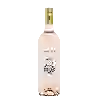
Winery 90+ CellarsLot 124 Rosé
This wine generally goes well with pork, vegetarian or poultry.
Food and wine pairings with Lot 124 Rosé
Pairings that work perfectly with Lot 124 Rosé
Original food and wine pairings with Lot 124 Rosé
The Lot 124 Rosé of Winery 90+ Cellars matches generally quite well with dishes of pork, shellfish or vegetarian such as recipes of suckling pig leg in the oven, seafood lasagna or goat cheese and bacon quiche.
Details and technical informations about Winery 90+ Cellars's Lot 124 Rosé.
Discover the grape variety: Mourvèdre
Mourvèdre noir is a grape variety originating from Spain. It produces a variety of grape specially used for wine making. It is rare to find this grape to eat on our tables. This variety of grape is characterized by medium to large bunches, and grapes of medium size. Mourvèdre noir can be found in several vineyards: South-West, Cognac, Bordeaux, Provence & Corsica, Rhône valley, Languedoc & Roussillon, Loire valley, Savoie & Bugey, Beaujolais.
Informations about the Winery 90+ Cellars
The Winery 90+ Cellars is one of of the world's greatest estates. It offers 193 wines for sale in the of Coteaux d'Aix-en-Provence to come and discover on site or to buy online.
The wine region of Coteaux d'Aix-en-Provence
Côteaux d'Aix-en-Provence is one of the main French appellations in the Provence wine region, located in the extreme southeast of the country. It is the second largest appellation in the region, with about 4,000 hectares North and west of Aix-en-Provence - the town from which it takes its name. The area also bears the tiny title of AOCPalette. The Côteaux d'Aix-en-Provence appellation was first introduced as a VDQS in 1956, having been informally known as Côteaux du Roy René (René d'Anjou being a 15th century French king famous for his love of wine and the Vine).
The wine region of Provence
Provence is a wine region in the far southeast of France, best known for the quality (and quantity) of its rosé wines and for its Warm, mild Climate. The modernization that is taking place in many of the traditional wine regions of southern France has not yet taken place to the same extent in Provence, but there are Clear signs of change. The region's Grape varieties, in particular, have come under scrutiny in recent decades. Traditional varieties such as Carignan, Barbaroux (Barbarossa from Sardinia) and Calitor are being replaced by more commercially viable varieties such as Grenache, Syrah and even Cabernet Sauvignon.
The word of the wine: Skinny
Thin and lacking in substance in the mouth.












